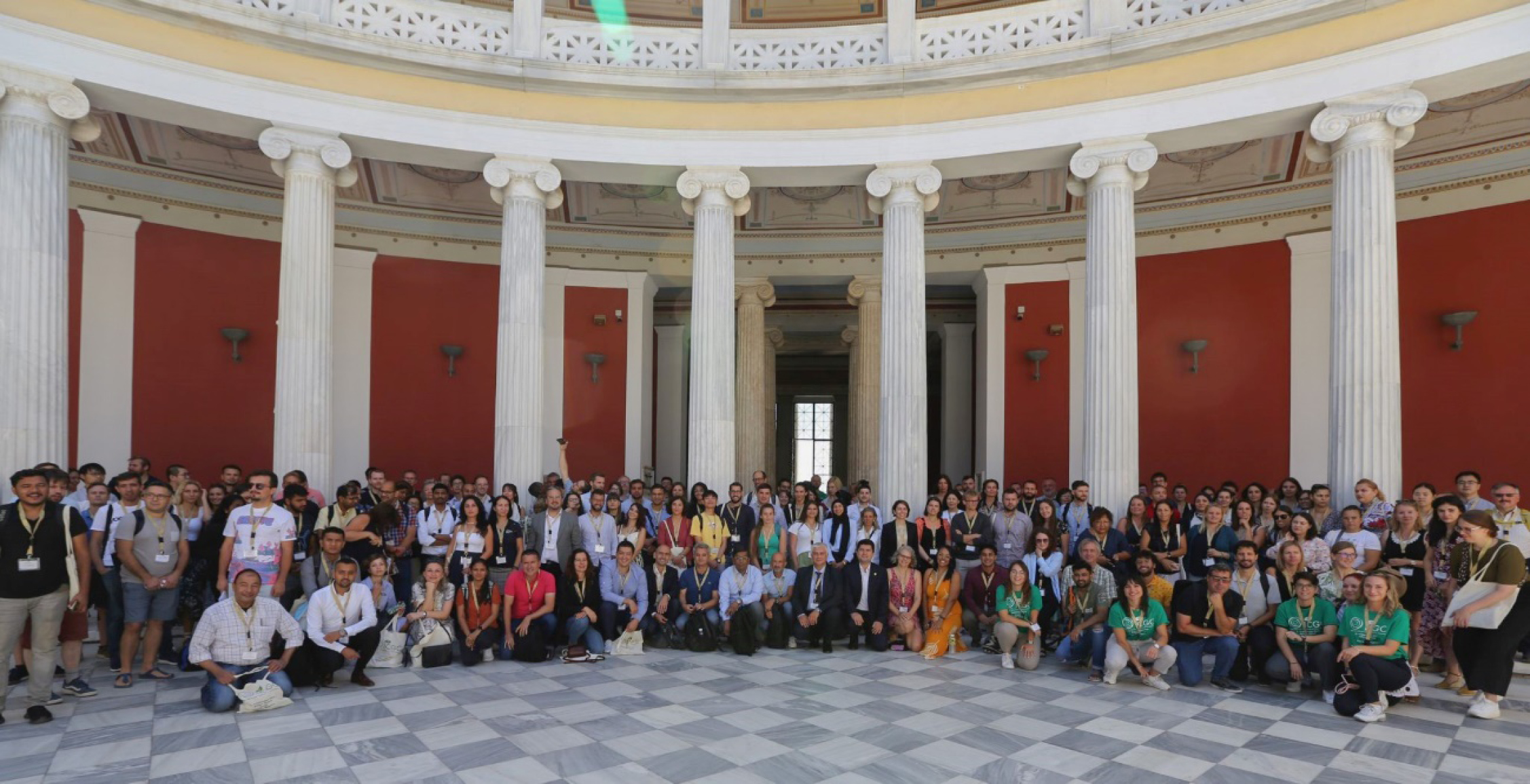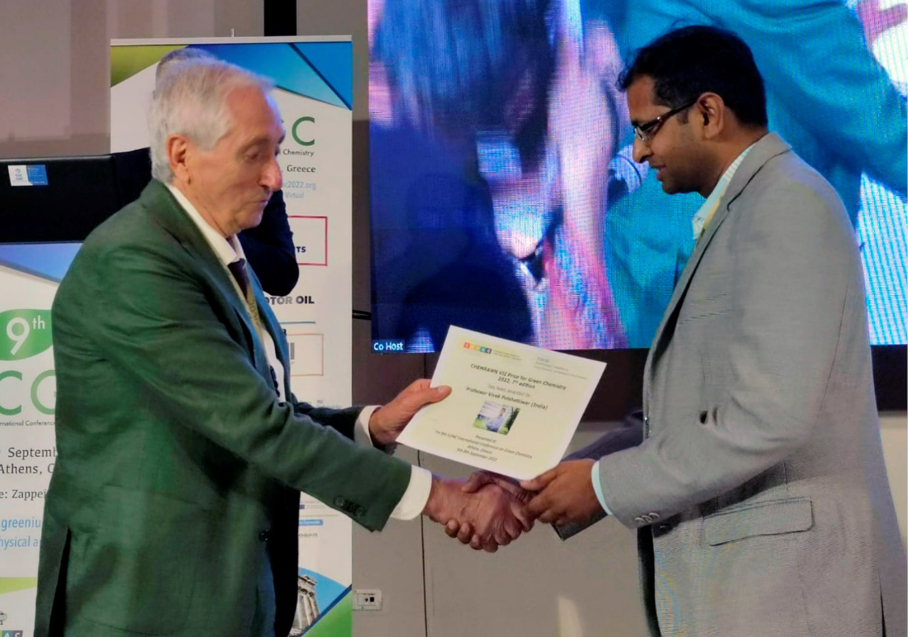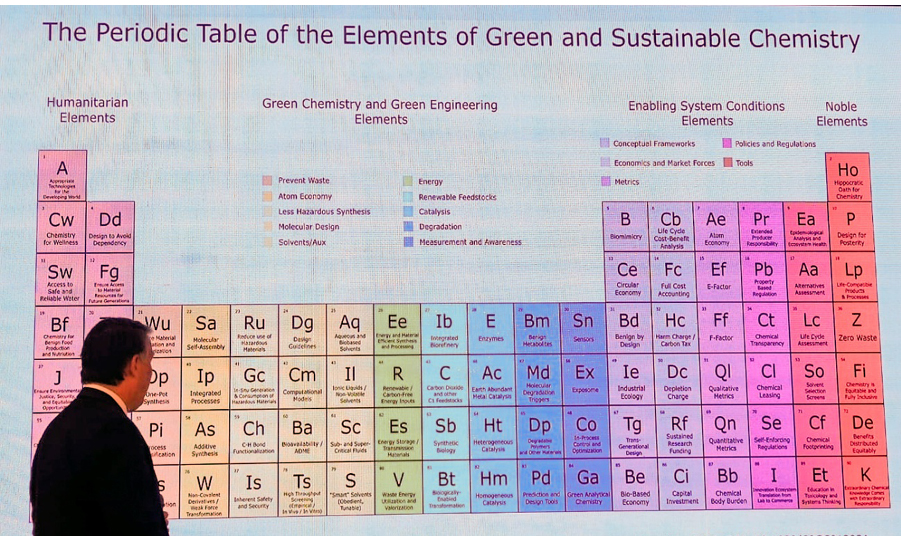Green Chemistry in Greece
-
Javier García Martínez

Group picture of the participants of the 9th International Conference on Green Chemistry, taken at the Zappeion Megaron, Athens, where the event was held.
A few months after the launch of the International Year of Basic Sciences for Sustainable Development (IYBSSD), several hundred chemists joined in Athens for the 9th IUPAC International Conference on Green Chemistry 5-9 September 2022. This meeting was co-organized by the Association of Greek Chemists and the IUPAC interdivisional Committee on Green Chemistry for Sustainable Development (ICGCSD) with the objective of bringing together all relevant stakeholders from academia, research, industry, NGOs, policymakers and society, to exchange and disseminate knowledge and ideas that promote the concept of green chemistry, sustainable development, and circular economy.
During his opening remarks, IUPAC President, Javier García-Martínez said “As we meet here in Athens, a series of consecutive heat waves continue to cause record-breaking temperatures. This summer, many countries have suffered devastating fires that have destroyed more than three million hectares and affected the lives of tens of thousands of people. Along with climate-related trends, such as droughts, this situation is threatening the nutrition security and the political stability of many countries. That is why this meeting is so important to identify and accelerate the solutions we so urgently need. The technologies that will be presented and discussed this week are instrumental to overcome the challenges we are facing”.
During this meeting, Pietro Tundo, founding chair of ICGCSD was presented with the lifetime achievement award by the Association of Greek Chemists and Vivek Polshettiwar, received the 2022 IUPAC-CHEMRAWN VII Prize for Green Chemistry in recognition of his outstanding contributions to the development of novel nanomaterials for catalysis, solar energy harvesting, and CO2 capture-conversion to tackle climate change. (https://iupac.org/vivek-polshettiwar-is-awarded-the-2022-iupac-chemrawn-vii/)

Vivek Polshettiwar received the 2022 IUPAC-CHEMRAWN VII Prize for Green Chemistry, from Prof. Pietro Tundo (left), founding chair of the IUPAC ICGCSD.
Paul T. Anastas, Director of Yale University’s Center for Green Chemistry and Green Engineering delivered the plenary talk “Green Chemistry, . . . to solve most of the world’s problems” in which he summarized some of his main contributions to the field of green chemistry over the last decades and comment on the challenges we face to make a significant difference in the way the chemistry enterprise relates with the Planet.
This 9th ICGC is part of a series of international congresses on green chemistry and sustainable development that started in Germany (2006) and is co-organized by the IUPAC ICGCSD. Its current chair, Buxing Han gave a short presentation on the goals, activities, and projects of this IUPAC interdivisional committee and his vision on the future of green chemistry for sustainable development.
With the participation of representatives from 74 countries, the IUPAC International Conference on Green Chemistry is the most global meeting on this topic that included sessions on green solvents, sustainable catalytic and synthetic processes, biomass conversion to fuels, chemicals and polymers, CO2 utilization, alternative fuels and green energy, benign low-energy chemical processes, nanomaterials for energy and the environment, pollution prevention and remediation, computational chemistry, green chemistry metrics and environmental assessment, sustainable industrial processes, waste recycle and valorization, and circular (bio)economy.
The conference program consisted of 9 Plenary and 17 Keynote Lectures, 200 Oral and 300 Poster presentations. Five Special Issues will be dedicated to the 9th ICGC, in the journals Pure and Applied Chemistry (IUPAC/De Gruyter), Sustainable Chemistry & Engineering (ACS), Green Chemistry (RSC), Sustainable Chemistry and Pharmacy (Elsevier), and Catalysis Today (Elsevier), featuring selected high-quality papers presented at the conference.

Paul Anastas presenting the Periodic Table of the Elements of Green and Sustainable Chemistry during his plenary lecture. (see book of the same title, ISBN 978-1-7345463-0-9, published at https://greenchemistry.yale.edu)
©2023 IUPAC & De Gruyter. This work is licensed under a Creative Commons Attribution-NonCommercial-NoDerivatives 4.0 International License. For more information, please visit: http://creativecommons.org/licenses/by-nc-nd/4.0/
Articles in the same Issue
- Masthead - Full issue pdf
- Secretary General's Column
- Beginnings, Reviews, and Rejuvenation
- Features
- Plastic post-Nairobi needs IUPAC involvement
- NFDI4Chem—A Research Data Network for International Chemistry
- WorldFAIR Chemistry: Making IUPAC Assets FAIR
- Conformity Assessment of a Substance or Material
- IUPAC Wire
- IUPAC is seeking Expressions of Interest to host the General Assembly and World Chemistry Congress in the year 2029
- IUPAC Awards in Analytical Chemistry—Call for nominations
- 2023 IUPAC-Solvay International Award For Young Chemists—Call For Applicants
- IUPAC-Zhejiang NHU International Award For Advancements In Green Chemistry—Call For Nominations
- IUPAC Elections for the 2024–2025 Term
- IUPAC welcomes its new Executive Director, Dr. Greta Heydenrych
- IUPAC scientific journal Pure and Applied Chemistry names Ganesan interim editor
- Best Practices in Chemistry Education and Around e-Waste
- Erratum
- Project Place
- Introducing the IUPAC Seal of Approval for a wider adoption of IUPAC recommended symbols, terminology and nomenclature: Stage 1—Symbols
- Effective teaching tools and methods to learn about e-waste
- A Collection of Experimental Standard Procedures in Synthetic Photochemistry
- Making an imPACt
- A brief guide to polymerization terminology (IUPAC Technical Report)
- IUGS–IUPAC recommendations and status reports on the half-lives of 87Rb, 146Sm, 147Sm, 234U, 235U, and 238U (IUPAC Technical Report)
- Terminology for chain polymerization (IUPAC Recommendations 2021)
- Pesticide soil microbial toxicity: setting the scene for a new pesticide risk assessment for soil microorganisms (IUPAC Technical Report)
- Specification of International Chemical Identifier (InChI) QR codes for linking labels on containers of chemical samples to digital resources (IUPAC Recommendations 2021)
- Conference Call
- Chemistry Education (ICCE 2022)
- ICCE—a short historical perspective
- Green Chemistry in Greece
- Theoretical and Computational Chemistry
- Assessment of Performance and Uncertainty in Qualitative Chemical Analysis
- Polymer Synthesis
- Mark Your Calendar
Articles in the same Issue
- Masthead - Full issue pdf
- Secretary General's Column
- Beginnings, Reviews, and Rejuvenation
- Features
- Plastic post-Nairobi needs IUPAC involvement
- NFDI4Chem—A Research Data Network for International Chemistry
- WorldFAIR Chemistry: Making IUPAC Assets FAIR
- Conformity Assessment of a Substance or Material
- IUPAC Wire
- IUPAC is seeking Expressions of Interest to host the General Assembly and World Chemistry Congress in the year 2029
- IUPAC Awards in Analytical Chemistry—Call for nominations
- 2023 IUPAC-Solvay International Award For Young Chemists—Call For Applicants
- IUPAC-Zhejiang NHU International Award For Advancements In Green Chemistry—Call For Nominations
- IUPAC Elections for the 2024–2025 Term
- IUPAC welcomes its new Executive Director, Dr. Greta Heydenrych
- IUPAC scientific journal Pure and Applied Chemistry names Ganesan interim editor
- Best Practices in Chemistry Education and Around e-Waste
- Erratum
- Project Place
- Introducing the IUPAC Seal of Approval for a wider adoption of IUPAC recommended symbols, terminology and nomenclature: Stage 1—Symbols
- Effective teaching tools and methods to learn about e-waste
- A Collection of Experimental Standard Procedures in Synthetic Photochemistry
- Making an imPACt
- A brief guide to polymerization terminology (IUPAC Technical Report)
- IUGS–IUPAC recommendations and status reports on the half-lives of 87Rb, 146Sm, 147Sm, 234U, 235U, and 238U (IUPAC Technical Report)
- Terminology for chain polymerization (IUPAC Recommendations 2021)
- Pesticide soil microbial toxicity: setting the scene for a new pesticide risk assessment for soil microorganisms (IUPAC Technical Report)
- Specification of International Chemical Identifier (InChI) QR codes for linking labels on containers of chemical samples to digital resources (IUPAC Recommendations 2021)
- Conference Call
- Chemistry Education (ICCE 2022)
- ICCE—a short historical perspective
- Green Chemistry in Greece
- Theoretical and Computational Chemistry
- Assessment of Performance and Uncertainty in Qualitative Chemical Analysis
- Polymer Synthesis
- Mark Your Calendar

